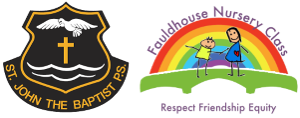Credit Union
Information on our partnership with the local Credit Union and how our children can save.
Credit Union
In association with Blackburn & Seafield District Credit Union (BSDCU) we are proud to present St John the Baptist Primary School Credit Union.
The school credit union takes place every Monday and is run by a team of children in the school alongside volunteers from BSDCU.
How to control our finances is one of the most important lessons we can teach children. The Credit Union provides the practice to the financial education taught in schools - planning and saving.
Blackburn & Seafield District Credit Union has been running saving schemes in schools since 1996 and now operates over 20 school savings schemes - the second highest in the UK!
Children take part in the saving process by paying into a savings account regularly. It can be as little as 10p per week but it will teach them the savings habit.
What should they be saving for?
It could be school trips, new computer game, holidays, Christmas/birthday presents... anything at all.
How can my child open an account?
Complete a Junior Application Card (available from Primary 6) and get your child to hand it back in to the Primary 6 teacher who will pass it on to the BSDCU team at the next school collection. Within a fortnight, your child will be given their passbook and can start to save.
How much do they have to save?
From 10p upwards, whatever you are happy with your child taking to school. Larger sums can be paid by cheque (made payable to BSDCU) or brought to the Credit Union Office or local collection point - see our website (link below) for details.
How do they pay into their account?
Complete the Pay In Slip - name, address, account number, how much is being saved and what their new savings total will be. Bring the passbook, pay in slip and money to the next school collection. The passbook will be updated and new pay in slip issued.
How can they withdraw savings?
Savings can be withdrawn at the credit union office or at any collection point. Savings can be withdrawn at school with 7 days notice and a letter from parents/carers. Payments are usually by cheque but cash can be arranged if asked for in the parents/carers letter. Cheques can be made payable to the school to pay school trips.
Is there interest on savings?
Credit Unions declare a dividend at the end of the financial year. After contributing to the reserves, any surplus is returned to the members as a dividend on savings. In the past, dividends of 1 to 3% have been paid but it is dependent on the surplus.
Piggy Banks
The Credit Union runs EMPTY YOUR PIGGY BANK DAYS when piggy banks / jars / bags can be emptied/counted/bagged and the value paid into a savings account.
Can parents join the Credit Union?
Yes but not through a school collection. Please contact the office.




